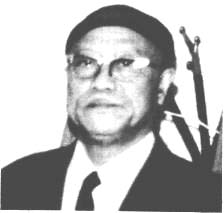|
The
feeling he wishes to convey here is one of rugged, independent happiness.
The reference to the "growing family" is from the Book of Odes,
the first of the Chinese classics. General Li is saying that in his old
home he planted the fields and dug wells and was happy as the family grew
every day.
"Tossing
away the brush at twenty" refers to his response to the invasion of
the China mainland by the Japanese. This line is an allusion to Pan Ch'ao
of the Han, a great general, who ceased his studies to repel a foreign
invasion.
But
now, the poem goes on, he is old and wrinkled and far away from his
boyhood home. He thinks about returning to his native village to circle
the pine tree before his cottage. This refers to a dream his mother had
before he was born, that he was walking around the pine tree before their
house. Shortly thereafter he was born.
At
this point the Venerable Abbot stopped and said, "You really haven't
got any guts. You were a son once, and you still want to go back and
become a son all over again." The General laughed. He was really
surprised.
When
General Li took refuge with the Venerable Abbot he saw a number of
inconceivable things (see letter which follows), and during the ceremony
his heart of great compassion was born. With its birth, every thought of
desire ceased and what he experienced was subtle and wonderful. At that
time the Venerable Abbot gave him a method to cultivate the Way, the mind
seal, for it can be said that he had already had an enlightenment. Then
the Venerable Abbot taught him this verse:
Walking,
standing, sitting, and lying down.
Don't
separate from This.
Having
left This,
You've
made a mistake.
The
General wrote a poem in reply:
Every
minute, every second, one must be on guard.
Every
second, every moment, one must cultivate the Way.
Not
drifting off for even an instant,
Not
even for a moment can one leave the Middle Way.
General
Li's letter to the Venerable Abbot of Gold Mountain, along with other
examples of his calligraphy, appear on the following pages. The letter
itself appears on page 58 with an English translation on page 62. His calligraphy of
the poems in the proceeding article will appear in future issues of Vajra
Bodhi Sea.
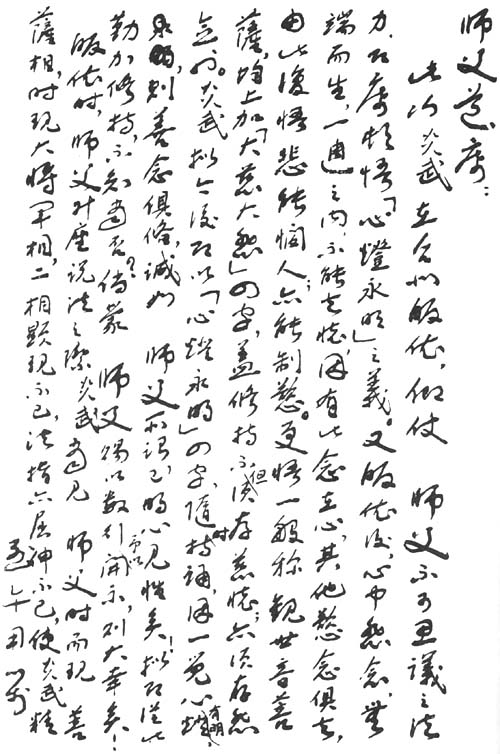

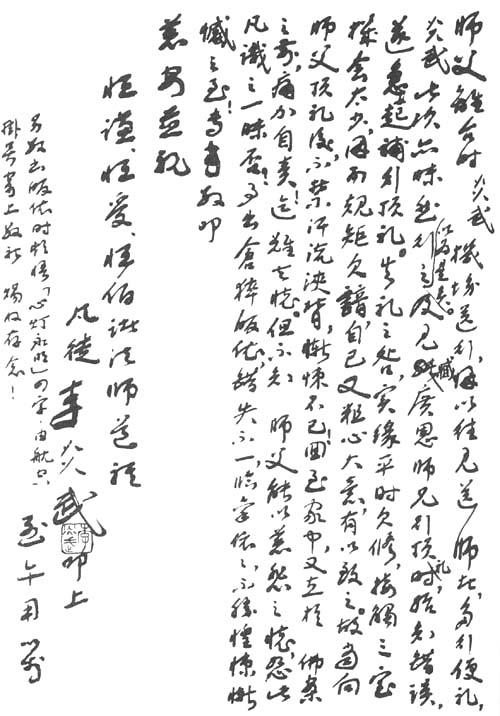
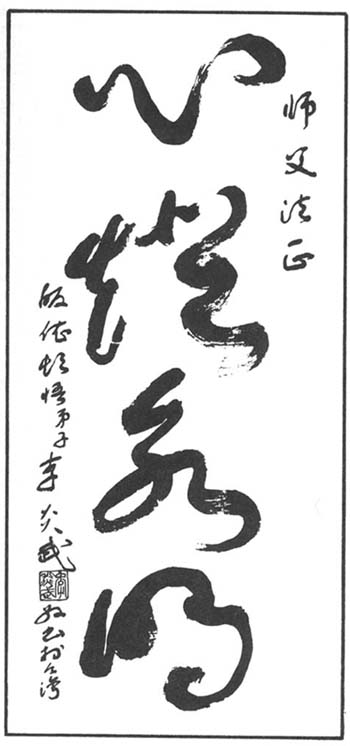
Master of the
Orthodox Dharma
The Mind’s Lamp is Eternally Bright.
Respectfully
written in Taiwan by Disciple Li Yen-wu
Master
on the High Seat of the Way:
When
Yen-Wu took refuge recently in Taiwan, he looked up in awe at the Master's
inconceivable Dharma power. When the Master was on the High Seat this
disciple had a sudden awakening to the meaning of "The mind's lamp is
eternally bright." After taking refuge, a tremendous thought of
compassion remained in my mind at all times for about a week. Because of
that thought, this disciple had no extraneous thoughts of desire. Because
of that, this disciple had a further awakening to how compassion enables
one to be empathetic towards others, and how it can sever desire.
This
disciple further realized why it is that most people, when reciting the
name of Kuan Shih Yin Bodhisattva, add on the words, "Greatly Kind
and Greatly Compassionate." It is because those who cultivate in this
way must not only maintain a heart of kindness, but also must maintain
compassionate thoughts. From today on this disciple will at all times
cultivate and maintain the words "The mind's lamp is eternally
bright," because upon awakening to the mind's lamp, this disciple has
been totally filled with good thoughts. These thoughts are truly as the
Master describes, "understanding the mind and seeing the
nature." Would the Master say it is appropriate for me to diligently
cultivate in this way? If the Master would give but a line or two of
instruction, this disciple would be most happy.
At
the refuge ceremony when the Master was on the High Seat speaking Dharma,
Yen-wu noticed that the Master first appeared to be a Bodhisattva, and
then appeared to be a great General. Then these two appearances began
alternating in rapid and endless succession while at the same time his
Dharma fingers opened out in a compassionate gesture and closed up into a
fierce fist again and again without cease. Yen-wu became totally
enthralled and absorbed in watching this and suddenly had the awakening to
the mind's lamp. After the ceremony was finished this disciple asked
those of great virtue who had been in attendance if any of them had seen
the Master manifest such Dharma appearances. No one had seen them. Yen-wu
alone had seen them. Again, how fortunate!
After
the master finished speaking Dharma he instructed his disciples: "You
should bear what others cannot bear; yield what others cannot yield.
Even if you are beaten or scolded you should bear it and be
yielding." After that instruction he asked, "If someone were to
scold your Master what would you do?"
At
that time, yen-wu was muddled and unclear and blurted out in reply,
"Laugh it off."
The
Master said, "What if someone wanted to kill your Master?"
This
disciple immediately answered, "Stand up and come forward." The
meaning being that this disciple would die in the Master's stead. Because
the ceremony for taking refuge had been long, it was feared the Master was
too tired, and so it was not convenient to ask for more instruction at
that time.
After
this disciple left he realized that "Laugh it off" was not the
way to be patient and yielding. This disciple should have said that he
would try to explain the doctrine to that person, and if that person still
did not understand, then this disciple would "shake out his sleeves
and leave," that is, he would have nothing more to do with him. It
would not be appropriate to scold that person in return. And if someone
wanted to kill the Master, upon further reflection, that answer was also
not right. This disciple should have said he would try to reason with the
person or would use his strength to protect the Master. If he could not
sufficiently protect the Master, then he would die in the Master's stead.
After Yen-wu thought this over, he wrote a note and told how these two
answers were incorrect, and what he felt he should have said, and tacked
the note on the wall of the Chih Lien Ching She (the temple where the
Master had spoken Dharma and transmitted the three refuges) to let those
of great virtue examine it and judge for themselves. This disciple doesn't
know what the Master would say about this.
When
the Master departed from Taiwan, Yen-wu went to see the Master off.
Because he observed that others just gave the Master a brief bow, Yen-wu
did likewise, and thought that he had done the right thing. But then Tsang
Kuang-en arrived and made a full prostration before the Master. Seeing
that, Yen-wu realized his mistake, and immediately tried to correct it by
making a full prostration before the Master right then and there. The
reason for this breach of etiquette was that this disciple has not
cultivated, nor has he had much opportunity to be in the presence of the
Triple Jewel, and so he does not know the rules. Adding to that the fact
that he is a coarse person, these were the factors that contributed to the
mistake. Because of his previous mistake, after Yen-wu finished his full
prostration before the Master, his back broke out in a profuse sweat and
he experienced total and endless shame! After he returned home, he
knelt before the Buddha at the altar in his home and painfully chastised
himself further. It is still difficult to forget. This disciple doesn't
know if the Master will extend his compassion to forgive this disciple's
vulgar lack of clarity. Having been a disciple for such a short time, Yen-wu
has already made so many mistakes. As he writes, this feeling of regret
remains with him still. It is impossible to say how agitated and
regretful—how deeply sorry he is. It is concerning these matters that
Yen-wu has written the Master, and respectfully bows.
Compassion
and peace
Common Disciple
Li Yen-wu
P.S. After the
refuge ceremony this disciple wrote out the four words "The mind’s
lamp is eternally bright" on a scroll and has airmailed it to the Master
by way of remembrance.
Don't
say that the lives of tiny creatures are insignificant;
They,
too, have bones and flesh; they, too, have skin.
I
beg you. Kind Sir, do not shoot the birds in the boughs,
For
the babies there are waiting for their mother to return.
"Poem
on the Prohibition against Taking Life"
by Pai (Po) Chu-i.
Copied
respectfully in the summer of Chia-yen
as a keepsake for San Francisco's
Gold Mountain Monastery
By Li Yen-wu of Ch'ang-shan
Translated
by Bhiksuni Heng Yin
General
Li Yen-wu is an accomplished calligrapher whose work is held in highest
esteem. Among contemporary calligraphers, no one has been able to match
the strength of his brush; his characters are written as if they were
carved in stone. Some say that he has even surpassed the running style of
Mr. Yu Yu-jen, upon whose work he based many years of his own practice.
The combination of strength and value in General Li's calligraphy is very
rare. His poems and calligraphy have been widely published, and can
be found in museum collections.
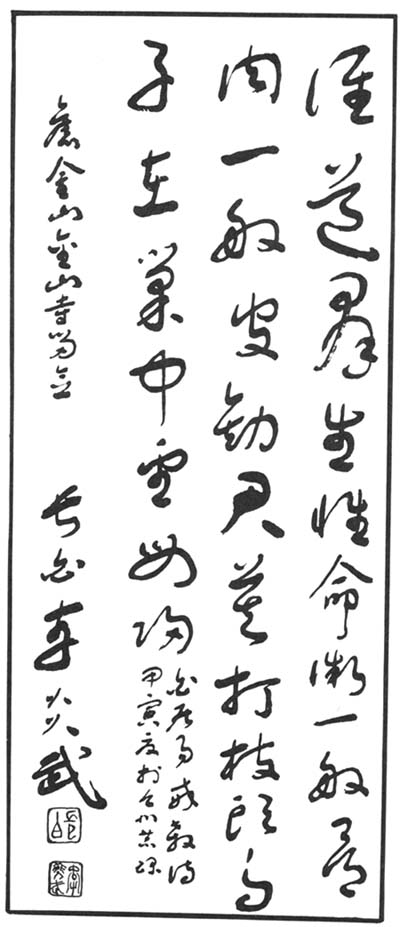
|
